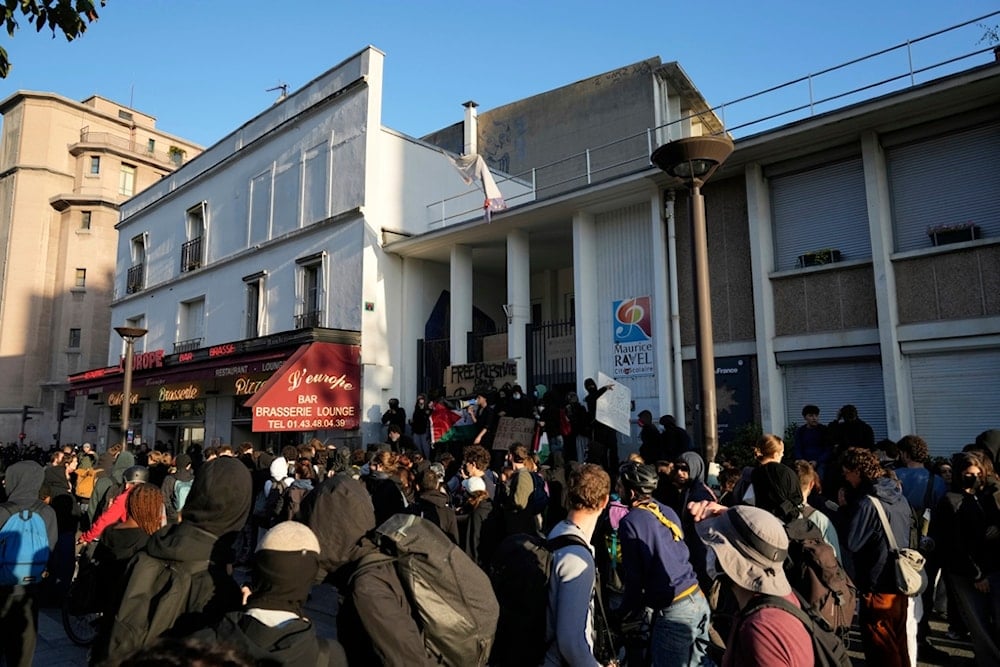France faces mass strikes over Macron’s cost-cutting budget
Unions stage nationwide strikes over Macron’s €44 billion budget, disrupting transport and schools as police brace for up to 900,000 protesters.
-

Students block the entrance of a school during a protest called by major trade unions to oppose budget cuts, in Paris, France, Thursday, September 18, 2025. (AP)
France prepared on Thursday for a day of nationwide disruption as unions launched mass protests against President Emmanuel Macron’s budget policies, threatening transport paralysis and warning of unrest from extremist elements.
Prime Minister Sébastien Lecornu, appointed last week as Macron’s seventh head of government, had vowed to reset relations with voters amid a simmering political crisis. But his arrival has done little to quell resentment over a draft €44 billion ($52 billion) cost-saving budget drawn up by his predecessor, François Bayrou, or over a proposal to eliminate two public holidays.
Union leaders say the government’s policies, along with last year’s controversial pension reform, have eroded public trust. “Colleagues were not fooled by the appointment of Sébastien Lecornu,” said Sophie Venetitay, secretary-general of the Snes-FSU teachers’ union. “It did not calm the anger.”
Strikes, nationwide protests
Walkouts were expected across the education, health, and transport sectors. Around a third of teachers planned to strike, nine out of 10 pharmacies were set to close, and only Paris Metro’s three driverless lines were expected to run normally.
Officials predicted between 600,000 and 900,000 protesters would take to the streets, which would make for the largest turnout since early 2023, when unions mobilized for months against Macron’s pension overhaul, ultimately passed without a parliamentary vote.
Heavy police presence amid security fears
Interior Minister Bruno Retailleau said authorities anticipated a “very, very strong” mobilization, with a risk of sabotage by ultra-left groups. More than 80,000 police and gendarmes, along with drones, water cannons, and armored vehicles, were deployed to secure protests.
Paris police chief Laurent Nuñez voiced concern about rioters infiltrating marches, urging businesses in central districts to close or shield storefronts.
The demonstrations are seen as an early test for Lecornu’s crisis management skills, but analysts note that much of the anger is directed squarely at Macron, whose popularity has plunged with 18 months left in office.
Wider context
The protests come amid growing political instability. Last week, former PM Francois Bayrou lost a vote of confidence in the National Assembly, following opposition to his 2026 budget framework aimed at cutting €44 billion in public spending. France’s public debt currently stands at 113% of GDP, one of the highest in the European Union.
In response to the crisis, French President Emmanuel Macron appointed Defense Minister Sebastien Lecornu as the new prime minister on Tuesday. Lecornu has been tasked with consulting political parties before forming a new government.
Budget-related political infighting has become a persistent issue in French politics. Last year, the failure to pass the 2025 budget led to the collapse of Michel Barnier’s government after a no-confidence motion united both far-left and far-right parties.
In parallel with the grassroots movement, France’s major trade unions have announced a national day of mobilization on September 18, signaling a broader, more coordinated wave of resistance to the government's economic policies.
As tensions mount, the coming weeks are expected to test both the resilience of the protest movement and the ability of the Macron administration to restore political and economic stability.

 3 Min Read
3 Min Read










